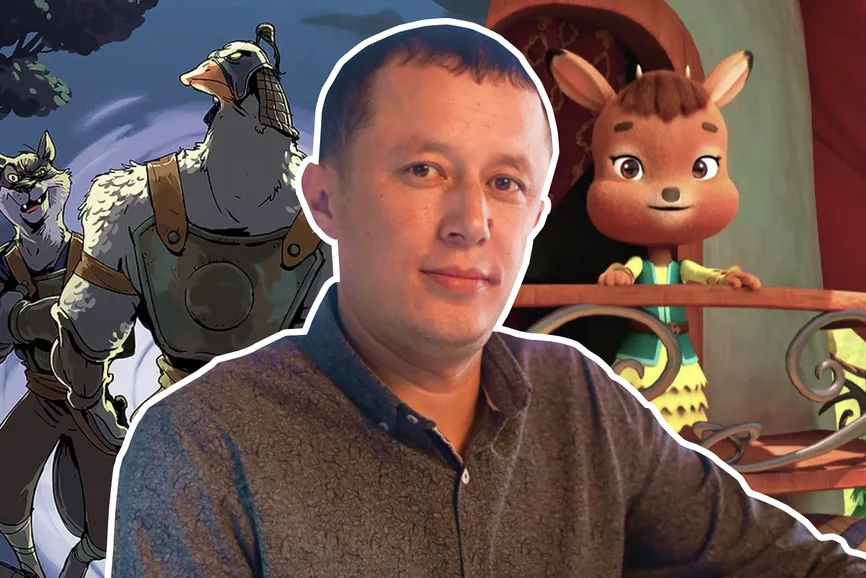The Kazakh film industry has been on a creative roll this year. Besides raking up awards at international festivals and organizing Kazakh cinema weeks in major world cities, perhaps the biggest headliner of 2022 was the development of domestic dubbing studios that had us eager to hear the sound of Marvel characters finally speaking in Kazakh.
From documentary films to comedies, we have seen every genre have its moment in the spotlight except one—animation.
In July of this year, the Ministry of Culture and Sports of Kazakhstan announced the creation of the Qazaq Animation artistic association. This newly formed organization had to fulfill an ambitious goal: announce 10 pilot projects by the end of 2022. In October, Qazaq Animation promised to deliver 20 short films.
Dilshat Rahmatullin, the head of Dala Animation studio with over a decade of experience in cinematography, became the general producer of the association. He talked to QazMonitor about the future of the country’s animation industry and how cartoons help to preserve the Kazakh culture code.
Why was Qazaq Animation created in the first place?
If we don't make films about our culture, our characters, our history, then no one else will. Any foreign cartoon comes with its own values and stories that promote a certain way of living. The aim of Qazaq Animation is, after all, to educate the younger generation.
When a child knows where they come from and the cultural code they carry, they become stronger. When a child loses their identity and their cultural code, they ‘dissolve’; they won’t understand whether they are Superman or Spiderman or Kung Fu Panda. I'm not against that kind of development, but some cartoons are not suitable for our audience. I think if we fill [the market] with successful projects, we'll find the right balance.
Children are now being brought up by screens. If Kazakhstan does not produce its own content for children, then our children will be brought up by other cultures. This is very detrimental. In 10-15 years, we could experience problems where we see our culture change before our eyes.
Guided by this principle, we came up with the initiative. As a result, we received support from the government and Qazaq Animation was formed. After 30 years of independence, we have finally established such a community. It is the center of Kazakhstan’s animation circle where we always listen and try to solve problems of the studios and creators. In the first year, we have launched 20 short films with state funding. The products are made entirely in Kazakhstan.
Why are you planning to launch short films? Won’t full-length pictures be more suitable for the audience?
Some suggested launching just a couple of full-length films and series. But we made the optimal decision–20 independent animated pilot projects. This will allow us to study the market. When we start promoting these pictures, we will see which of them gets the most positive feedback. Then, next year we'll launch those projects as series. That's the right thing to do because it would be difficult to create a series or a feature film without a vision.
Now we have 20 projects in our arsenal. At least 50-60% of them should get audience acclaim. The works are also divided into subcategories by age to cover all age groups: +2, +6, and so on.
But I don't rule out the possibility that some ideas might turn into full-length films rather. There's already one example, by the way. Sac Studio is doing a five-minute picture from a script for a full-length feature. It will be like a teaser, and if it turns out to be presentable, it will serve as a springboard for the feature film.
How will the projects be promoted?
We will organize a presentation in Kazakhstan, and then we will participate in foreign film markets. The goal is to sell our films, generate our own money, and reach self-sufficiency. We will screen them in Dubai, Korea, and France. There are plans to organize Kazakh Animation Days and invite local and foreign producers.
First, we will cover the domestic market. In Kazakhstan, we will most likely organize free screenings and stream the films on kids’ channels as well as promote them on social media.
The Association also trains young Kazakhstani animators. How is the training process going?
We have a well-rounded approach to this matter. We invite specialists to share their experience with our animators. We organize master classes by these professionals. For example, we invited Oscar-nominee Konstantin Bronzit of Melnitsa studio. These things are an invaluable experience for companies that prepare pilots. They get the chance to discuss approved projects with these masters to identify problem areas and hone their skills.
We also plan to send students abroad for training at the expense of Qazaq Animation. We have selected students from various universities, and are now actively negotiating with Turkey, Poland, France and Spain. These will be short intensive programs helping emerging directors to learn the production process at big studios.
